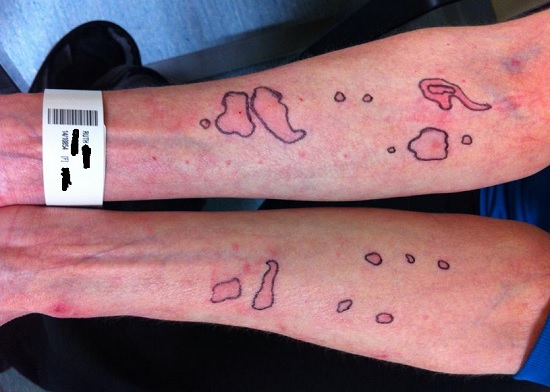And in doing so, many may be cutting out major food groups with potentially no good reason to do so.
This is nothing new, with the waiting lists for an appointment with allergy specialists people naturally turn to other sources of information.
This recent report makes for worrying reading…
Why are the UK public avoiding their GP?
Over half of the UK say that Covid-19 has made them more likely to try and diagnose their own symptoms before consulting a healthcare professional, a YouGov online study conducted on behalf of Thermo Fisher Scientific Inc, has found.
The new analysis, based on a survey of more that 2,000 UK adults aged 18+, shows that many are still reluctant to go straight to visit their GP when symptoms of an illness or health condition appear and will instead try to manage their condition alone first.
52% say that the pandemic has made them more likely to try and diagnose their own symptoms if feeling unwell, before consulting a GP. The survey also showed that since the beginning of the lockdown 39% are reluctant to visit their GP at this time because they didn’t want to waste their GP’s time. A quarter of respondents (25%) stated that they didn’t want to visit their GP because they were worried about catching Covid-19.
The UK has the highest prevalence of allergies
Avoiding the GP surgery has serious implications for many health conditions including allergy, where the UK has some of the highest prevalence rates in the world.
Affecting over 20% of the UK population, allergy can prove fatal without an accurate diagnosis. Despite this, more than a third (37%) of those surveyed said they considered allergies to be a ‘minor health condition’. Almost half (47%) incorrectly agreed that allergy was simply a more severe type of intolerance.
When asked in which ways, out of a list, they would respond if they or a family member developed symptoms of an allergy or intolerance,
- 59% said that they would search online for information and
- 56% would buy over the counter medication, such as antihistamines. 26% would consult a family and/or friend,
- only 10% would contact a patient charity (e.g. Asthma UK etc.) and
- 8% would buy a home testing kit online.
Amena Warner, Head of Clinical Services at Allergy UK, says, “We need to take allergy seriously and stop treating allergy and allergic asthma as ‘minor’ health conditions. Attempting to manage these kinds of conditions alone, without accurate diagnosis, can be dangerous.”
In the 20 years leading up to 2012, there was a 615% increase in the rate of hospital admissions for anaphylaxis in the UK. Today, a staggering 44% of British adults suffer from at least one allergy and the number continues to rise.

The most accurate way to discover a person’s allergy triggers, and potentially save lives, is through specific IgE testing*. Accurate testing is available through GP surgeries, yet almost two thirds (63%) stated they were not aware that this was the case. 80% of those surveyed, however, said that Covid-19 had made them aware that testing in order to track and trace diseases was important.
Warner continues, “Always speak to your doctor first and discuss options for getting a specific IgE test for what may be triggering your allergic symptoms and avoid trying to source online or unvalidated tests.”
Editor’s Notes
Thermo Fisher Scientific Inc. (NYSE: TMO) is the world leader in serving science, with annual revenue exceeding $25 billion. Our Mission is to enable our customers to make the world healthier, cleaner and safer. Whether our customers are accelerating life sciences research, solving complex analytical challenges, improving patient diagnostics and therapies or increasing productivity in their laboratories, we are here to support them. Our global team of more than 75,000 colleagues delivers an unrivalled combination of innovative technologies, purchasing convenience and pharmaceutical services through our industry-leading brands, including Thermo Scientific, Applied Biosystems, Invitrogen, Fisher Scientific, Unity Lab Services and Patheon. For more information, please visit www.thermofisher.com.
Allery UK is the leading UK patient charity dedicated to helping adults and children with all types of allergy. They work with government, professional bodies, HCPs and corporates to help improve the lives of millions of people with allergic disease. To find out more, please visit https://www.allergyuk.org.
*IgE tests, or immunoglobulin E tests, measure the levels of IgE, a type of antibody. Antibodies are made by the immune system to protect the body from bacteria, viruses and allergens. IgE antibodies are normally found in small amounts in the blood, but higher amounts can be a sign that the body overreacts to allergens. This can lead to allergic reaction. IgE testing is the most accurate and conclusive method to find out if you have an allergy.
Research was conducted amongst a group of 2045 adults (18+) nationwide. Fieldwork was carried out between the 26th – 29th June. The survey was carried out online and the figures have been weighted and are representative of GB adults.
What can we do about this?
More education is needed to help people understand which symptoms are an intolerance, and which more serious things indicate a real allergic reaction, and particularly what anaphylaxis looks like.
Do GP’s know how to recognise allergies and refer patients for expert help and testing?
I’d love to hear your views. Are you more or less likely to visit your GP now? Do you have food allergies or intolerances and have these been diagnosed with an IgE test?
Because not all tests are equal. There are many companies offering expensive tests which may not provide conculsive proof or reliable results.












In over 20 years of testing, Ruth, I’ve had only a handful of people who were wanting to test for actual IgE allergy so I think people go via their doctors or maybe use testing companies. I would say 99% of people don’t understand the difference between intolerance and allergy. I explain the difference sometimes it seems hundreds of times a week!
I was doing IgE testing via Genova Labs if asked but mostly I advised people to go via their GP and they are given skin prick testing initially.
The frustration for people comes in not understanding the differences in sensitivity types so they assume food intolerance when it could be IgE allergy or vice versa. And also in not being able to access proper classical allergy IgE testing as some health professionals dismiss their concerns so they turn to other avenues for testing.
I myself had oesophageal swelling from corn and was refused an Epipen by three doctors! It turned out to be an intolerance rather than an IgE problem, but they wouldn’t have known that because they didn’t test me! That said, it didn’t make it any less unpleasant or dangerous and I do worry that people think intolerance is somehow less of a problem than allergy – both are seen as ‘minor’ problems, as you say, but both can have a really major impact on people’s lives in different ways.
As usual, allergy/sensitivity/intolerance is a minefield. It needs real clarity, but then so does so much else at the moment…!
Thanks Micki, yes it is a minefield. You’re right, people don’t understand the language and it isn’t surprising. It occurred to me today that even hay fever is a ridiculous term. It’s rarely about hay and certainly doesn’t cause any fever. Yes very few people would think they had allergic rhinitis – an itchy nose and runny nose caused by an allergen trigger. Covers a multitude of triggers and causes and also a wide range of symptoms from mild to very extreme. Even hay fever can be so bad my sister in law is driven to her bed because she can’t breathe and can hardly see. Basic life functions are impossible and yet we think hay fever is pretty mundane and isn’t a problem.
And Allergies vs Intolerances is still a problem. People say they have an allergy when they have an intolerance and word allergy covers everything from mild hay fever to anaphylaxis. It’s so hard to understand and explain but like you say, even intolerances can be really painful and life limiting. I get IBS from certain things and the bloating and discomfort is so unpleasant – but the anaphylaxis is terrifying and yet that one is lurking… just waiting to get me when I or someone else makes a mistake. It doesn’t affect me until I eat the food, except it does affect me with anxiety, fear, depression etc. Thanks so much for your comment. It’s no wonder people turn to other avenues to a diagnosis.. I do worry about the NHS and how will cope with everything that’s been thrown at it after Brexit and Covid…